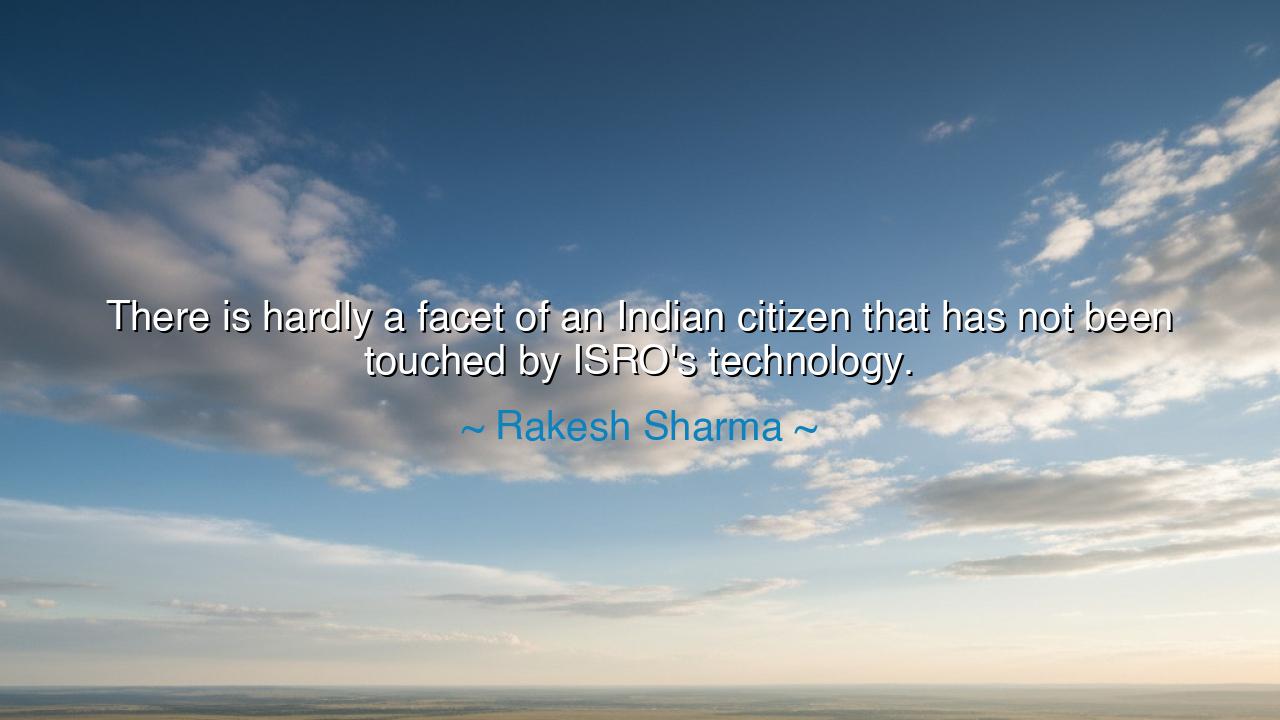
There is hardly a facet of an Indian citizen that has not been
There is hardly a facet of an Indian citizen that has not been touched by ISRO's technology.






Rakesh Sharma, the first Indian to journey into space, once declared with reverence: “There is hardly a facet of an Indian citizen that has not been touched by ISRO's technology.” In this statement, he speaks not only of rockets and satellites, but of the invisible web of benefits that space science has woven into the daily lives of millions. What seems distant and celestial—the work of the Indian Space Research Organisation (ISRO)—has descended into the soil, the marketplace, the village, and the home, shaping the destiny of a nation.
The origin of this truth lies in India’s journey from humble beginnings in space exploration to becoming one of the great leaders in global space technology. ISRO’s early missions launched from modest facilities, with equipment transported on bicycles and bullock carts, a symbol of determination in the face of scarcity. Yet from these small beginnings rose achievements that touch every citizen: telecommunications, weather forecasting, navigation, broadcasting, agriculture, education, and disaster management. Sharma, himself a witness to India’s space vision, understood that ISRO’s reach extended far beyond the stars into the heartbeat of everyday life.
History affirms this connection between space science and human progress. Just as the Apollo program in the United States yielded technologies that transformed computing, materials, and medicine, so too has India’s space program birthed innovations that improve water management, empower farmers through satellite imagery, and connect remote villages with education and healthcare. Thus, Sharma’s words carry the weight of both witness and truth: ISRO is not only about distant planets, but about uplifting society at home.
The deeper meaning of his statement lies in the union of science and service. Too often, technology is viewed as cold and distant, a pursuit of intellect alone. But ISRO’s work, born of visionaries like Vikram Sarabhai, was always tied to human need. Sarabhai himself declared that India did not pursue space for prestige, but to solve the pressing problems of poverty, communication, and development. Sharma’s words echo this vision: the touch of ISRO’s technology is the touch of service, the hand of science reaching out to uplift the poorest farmer as well as the modern urban citizen.
Consider the story of the Indian National Satellite System (INSAT). Launched to improve telecommunications and weather services, it became a lifeline for farmers, fishermen, and disaster management authorities. With its guidance, storms could be tracked, crops better planned, and lives saved. What greater proof is needed that space science touches the earth most powerfully when it serves humanity? This is the spirit that Sharma’s words honor.
The lesson is clear: greatness in science is not measured only by how far we reach into the heavens, but by how deeply we transform life on earth. ISRO’s work demonstrates that even the most advanced technologies can be harnessed for equity, connection, and dignity. Citizens must recognize and value this, not taking for granted the invisible threads of technology that sustain their lives.
Practical wisdom flows from this truth. Support institutions that serve with vision. Encourage young minds to pursue science not only for discovery, but for service. Celebrate the humble as well as the heroic achievements, for every satellite, every innovation, brings unseen blessings into homes and lives. And above all, remember that the true measure of progress is not prestige in the stars, but the upliftment of people on the ground.
Thus let Rakesh Sharma’s words endure as a reminder to future generations: the glory of ISRO is not only in the skyward gaze, but in the earthly touch. Every citizen of India, knowingly or unknowingly, has felt the blessing of its vision. And this is the highest calling of technology—that it should serve, uplift, and bind together the lives of the people.






AAdministratorAdministrator
Welcome, honored guests. Please leave a comment, we will respond soon